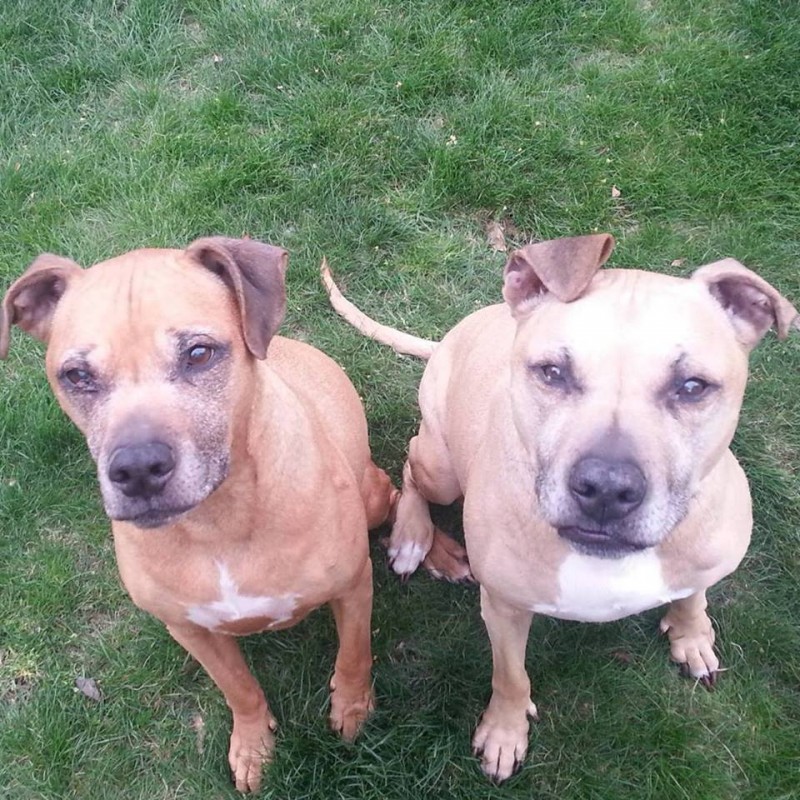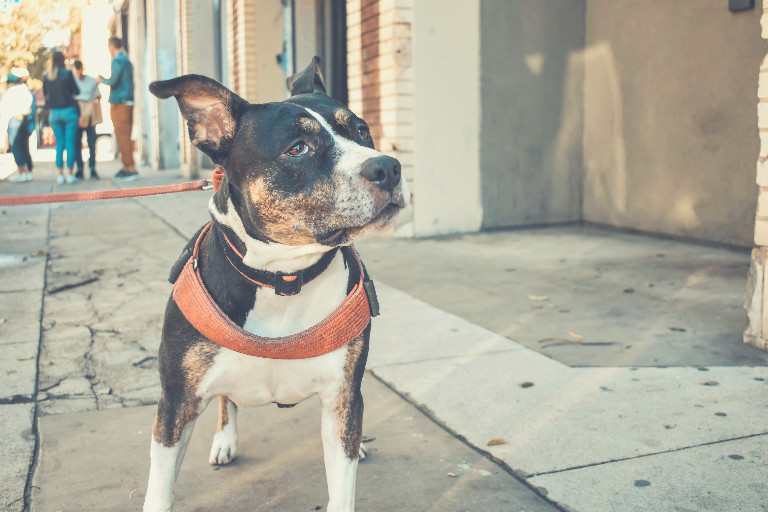When my pit bulls turned 10, I remember thinking how little time I have left with them.
At the time I did not know how long they were expected to live so I asked my vet just how long do pit bulls live on average. He let me know that I could expect my girls to live to be about 12-14 years of age! I had no idea they lived that long and it seriously made my day.
But he also let me know that there are just so many factors that can affect this range! Thankfully he knew my girls well since he has been taking care of them since they were about 5 years old and reassured me they could easily live to be 13 or 14.
I was thrilled that my girls Ginger and Riley, lived to the ripe old ages of 14 and almost 15 years of age.

I got the extra time I had hoped with them and although it was still hard as hell to let them go – I am thrilled I got as much time as I did. Riley was a pure American Staffordshire Terrier while her sister Ginger was a staffy mix.
Ginger remained healthy her whole life and I still believe she died of a broken heart.
Riley seemed to always have health issues, from ear infections, Cushing’s disease to knee issues. But overall they were healthy – happy – and most importantly, loved.
One thing I want to mention is the breeder practices that are happening. A lot of the pit bull breed is being ruined by bad breeders trying to make bigger and badder pit bull dogs. Please, if you choose to add a pit to your family, adopt one, it will be a healthier – and happier option for everyone.
The Pit Bull Name
Before we get started I wanted to make sure that it was understood that “pit bull’ in the US is not a breed, it is a label for a group of dogs.
The dogs that are considered a “pit bull” breed dog include:
- American Pit Bull Terrier
- American Staffordshire Terrier
- American Bully
- Staffordshire Bull Terrier
The information in this article is focused on all of the above breeds, but we are using the term “pit bull” as a catch all term.
How Long Do Pit Bulls Live?
Pit bulls have an average lifespan of 12-14 years old. There are many things that play into a pitbull lifespan though! Their general health, whether they are mixed with other breeds, lifestyle, and so much more can affect their length of life.
So, let’s talk in more detail about all the different things that affect how long pit bulls live.
If you have a mixed breed pit bull, most of this information will apply to them as well.
Pit Bull Life Expectancy Factors
Sadly, many dog parents contribute to shortening their dog’s life without even knowing it. Everything from food to exercise to training all have a significant impact on your dog’s health. So, choose wisely when it comes to your dog’s care routine.
Living Indoors or Outdoors
Indoor pit bulls will typically live longer than those that are kept outdoors. The risk of disease, lack of exercise, attacks by humans or even animal attacks are just a few of the reasons outdoor dogs have a shorter lifespan.
Because indoor dogs are more often provided proper health care, food and exercise it improves their life expectancy.
Spaying or Neutering
When you spay your female dog or neuter your male dog you are reducing the risk of them getting common cancer types and decreasing their chance of early death.
Female dogs that do not get spayed are a much higher risk for ovarian, uterine, and mammary cancer while male dogs are a a greater risk of testicular cancer.
While there are cancer treatments available to help your dog through these cancers, it is easier and cheaper to just have them spayed or neutered to reduce their chances of having it altogether.
Health Care
Just like humans, proper veterinary care is critical for your pit bulls health! Making sure they get their annual shots to fight diseases, flea and tick medicines and general check-ups will offer your dog a longer life. Basic health care and a healthy diet will go a long way.
Some of the basics of care you should provide your dog include:
- Bathing to keep their skin clean and free of bugs and allergens.
- Ear cleaning is critical to remove dirt, dander and other foreign objects. If you notice ear infections are becoming a chronic condition, it could be a sign of other issues so definitely visit the vet!
- Tooth brushing can help lessen the chances of dental disease or even infections that can arise if they teeth and gums should become infected.
- Spay or neuter reduces the chances of some common cancers.
- Flea and tick preventative will lessen the chance of heart worm or Lyme’s disease.
- Vaccinations to limit their catching any type of infectious diseases.
Types of Food & Treats
Feeding your pit bull quality food and treats will make a difference in the longevity of their life. A healthy diet with the proper amounts of food is a big factor in their ultimate health. Finding foods that have quality ingredients and meet your dogs needs is critical.
For example, puppies should have puppy food and seniors should have special senior food. These balanced dog foods offer your dog extra nutrients and ingredients to help them live a healthy life. You will also want to keep an eye our for food allergies that may affect your dog. It may take some time to find the right blend and brand for your dog.
Minimize the amount of what I call junk food your dog gets. I rarely gave my dogs people food which I do think helped extend their life.
Not all dog food treats are created equal so you will definitely want to talk to your veterinarian to ensure you are using the healthiest products possible.
As an example, many do not realize how bad rawhide can be for dogs! Providing them with rawhide alternatives can decrease chances of them choking or having digestion issues that rawhide can cause.
Exercise
Obesity is absolutely a problem in all dogs – pit bulls included! Obesity is just one factor that can lead to heart disease which can significantly decrease their life span.
Make sure your dog gets plenty of exercise whether a walk or plat time in the yard. Keeping your dog at a healthy weight can reduce obesity related diseases and getting that blood pumping will help keep their heart healthy.
The body condition of a pit bull breed dog should always be muscular and toned. As they age, of course the exercise will be reduced, but it is still good for them so do not stop it!
Maintain Regular Dental Care
We brush our teeth every day, but very few people remember to brush their dog’s teeth too. Believe it or not, it’s ideal to brush your dog’s teeth once a day or even twice a day if you’re able. Bark Bright has a dental kit that makes it so much easier to help with dog’s that may not enjoy a tooth brushing.
It might sound like a pain, but once you start doing it regularly, you’ll get into a routine. It’s estimated that about ⅔ of dogs develop inflammation or infections near their teeth and gums. So, brushing your dog’s teeth more often could help prevent this common health problem.
Genetic Issues
Unfortunately, with any dog breed – genetics play a part in life span. Sometimes pit bull puppies can develop a disease over time. Some of these genetic conditions can be easily treated with proper medications – so visiting the vet early is critical. This can include an autoimmune disease, congenital heart disease or even a degenerative disease.
If you are unsure of your dogs background and family tree, you may find some unexpected genetic issues pop up that you may not know about which is why it is important to know the more common diseases that a pit bull may have.
While it may not be common, some genetic diseases can result in an early death so it is important if you are using a breeder (which I do not recommend) – you know the background of the dog you want to add to your family.
Depending what the issue is, it may affect how long your pit bull will live.

Pit Bull Diseases
The breed is generally a healthy and strong breed with few health problems, but as with any breed of dog there are diseases and health issues that they are more prone to.
Some of the more common issues include:
- Hip dysplasia – usually a hereditary condition that can cause hip joints to not form properly or where the ball of the femur does not sit properly in the hip socket. This disease can lead to arthritis. Hip dysplasia is a condition which will typically show as lameness or difficulty moving.
- Knee problems – when a dogs kneecap (or patella) slips out of place your dog my try to put it back in place on their own. If they cannot or it becomes a more common happening, surgery may be required.
- Allergies – which can make your dogs’ skin itchy. This allergy is called “atopy” and if you notice your dog licking a lot or rubbing their face often it can be a sign. Repeated ear infections is another sign that allergies may exist.
- Skin infections – if your dog is not getting enough zinc or cannot absorb it properly you may find spots of scaling, crusty and red skin which will require medical attention and the addition of zinc to his diet.
- Nerve disease – another genetic disease call Neuronal Ceroid Lipofuscinosis which shows in younger dogs as a rear leg weakness and imbalances. It can also lead to loss of vision and progress to weakness of all legs.
- Balance problems – this will be seen in younger pits and will cause a dog to lose a sense of space and distance which results in balance and coordination.
- Bladder stones – too much uric acid is part of an inherited condition called Hyperuricosuria and can cause bladder or kidney stones.
- Obesity – while not a disease, an obese dog can have so many problems including heart disease, back pain, joint problems and other issues. Pit bulls need a lot of exercise and if they do not get it obesity can be a real problem.
- Thyroid – they are prone to hypothyroidism which is when the body does not make enough thyroid hormones. If you notice dry skin or coat, weight gain or behavioral chances these are a few signs of the disease.
- Progressive Retinal Atrophy – a degenerative condition where the dog eventually goes blind. While not painful, it is not curable.
- Cancer – at a higher risk of mast cell tumors which cannot always be seen easily.
What Was The Oldest Pit Bull?
I could not find any verifiable data on the oldest living pit bull breed dog. I found some forums and posts where pet owners claimed their pit was 18 – one even said 22 years old, but these can not be verified.
How old is the oldest pit bull you know?
There is no way to provide an exact life expectancy for a pit bull, there are just too many factors that play a part. But with great care and lots of love they can ultimately have a lifespan of 12-14 years on average.
While my girls did live a bit longer than that, we adopted them as puppies and they had the best health care we could afford.


These are all common sense responsibilities that every pet owner needs to adhere to in order to maintain long life and happiness in any breed of Dog they have!